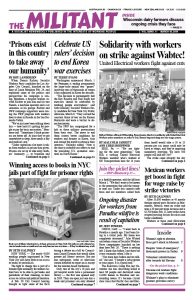Below is an excerpt from “The Crisis Facing Working Farmers” by Doug Jenness. It helps shine a light on how the workings of capitalism weigh on the ability of farmers and their families to get by today. It appears in New International no. 4. Copyright © 1985 by Pathfinder Press. Reprinted by permission.
Working farmers are victims of conditions over which they have no control. But these are not primarily natural conditions — bad weather, insect infestations, and so on. They are social conditions, the results of the workings of capitalism — exorbitant interest rates; monopoly control over marketing; and monopoly-rigged pricing of farm machinery, fertilizer, seeds, and fuel.
Working farmers have never faced easy conditions. Their situation took a major new turn for the worse in the mid-1970s. Farmers who borrowed heavily to purchase land as prices were rising in the 1960s and 1970s have seen the market price of their land — and thus their equity and collateral — plummet over the past five years. With production costs closing in on farm incomes throughout the past decade, farmers have fallen deeper and deeper into debt to finance more modern equipment needed to produce ever more commodities. …
One of the biggest costs to farmers goes to cover use of the land. As a result of the system of rents and mortgages that prevails in U.S. agriculture, the overwhelming majority of independent commodity producers must pay rent or make mortgage payments to use the land they work. Elimination of these payments would mean an immediate and substantial reduction in their production costs. …
Farmers are painfully learning that holding an ownership deed to the land where they raise their crops and livestock is no guarantee whatsoever of the use of that land. Under intense financial pressure farmers are often forced to sell at the first offer, which is frequently much lower than they could have received had they had more time. Other farmers are expropriated outright by the parasites who collect the interest on their mortgages.
Whether or not farm families hold on to their land, livestock, and machinery has nothing to do with how much they produce or how well they maintain their land. In fact, working farmers frequently end up in worse condition when they and other farmers bring in a large crop, since their prices and income plummet. There are few more powerful indictments of the capitalist system than what Marx called “the disastrous effect of good seasons for this mode of production.”
“Private” ownership of farm and ranch land, despite the capitalist-propagated mythology, does not go hand in hand with financial independence, self-reliance, and security. It is, to the contrary, the noose by which working farmers can be hanged. …
The necessary foundation for the lasting abolition of the current exploitative rents and mortgages system is the nationalization of the land.

